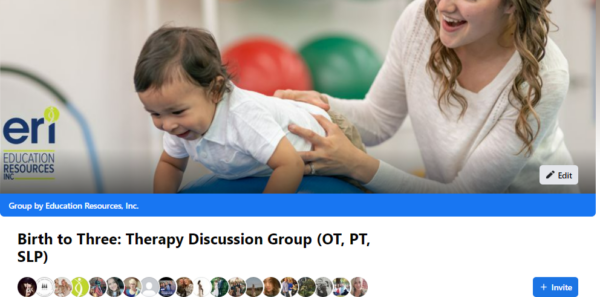Summertime! We hope you’ve been able to find a little time to relax, re-charge and have some fun adventures with family and friends this summer! As we all begin to think about summer winding down, we’re here to remind you that ERI has many CEU course opportunities available for you to improve your level of care while advancing your career.
Gain new skills to improve care for your patients or students.
At ERI, our CEU courses feature hands-on learning and evidence-based practice from inspiring, internationally renowned instructors. Our interactive, web-based courses include live Q&A sessions, hands-on applications, video analysis and problem-solving, allowing you to connect directly with experts in their field and fellow therapists, and earn continuing education credits – all from the convenience of home!
Browse the list below to see what we’ve got coming up in August…there’s really something for everyone: Physical Therapists, Occupational Therapists, Speech-Language Pathologists, Early Interventionists and Special Educators!
Click the links to learn more about each course and to register.

Babies’ Bodies and Brains: Multi-System Assessment and Treatment of the Premature/Medically Complex Infant for the Rehabilitation Professional
Course Faculty – Holly Schifsky
August 3, 4 and 5, 2023
 Premature and Medically Complex Neonates: Applying Critical Thinking to Support Long-term Outcomes
Premature and Medically Complex Neonates: Applying Critical Thinking to Support Long-term Outcomes
Course Faculty – Kati Knudsen
August 10 and 11, 2023

Primitive Reflexes: Strategies to Promote Integration – Strengthening Foundational Skills
Course Faculty – Janine Wiskind
August 17, 18 and 19, 2023
Intervention in the NICU: A Neurodevelopmental Approach
Course Faculty – Roberta Gatlin
August 18 and 19, 2023
Motor Learning: Tools to Enhance Academic Skills Through Movement
Course Faculty – Josephine Bardabelias
August 22, 23, 29 and 31, 2023

Ambulation, Activity and AFOs: Addressing the Ankle to Improve Gait and Function
Course Faculty – Amanda Hall
August 25 and 26, 2023
Practical and Effective Strategies to Improve Self-Regulation and Executive Function
Course Faculty – Jocelynn Wallach
August 25, 2023
 Assessment and Treatment of Complex Feeding Disorders: Assessing and Treating The Whole Child
Assessment and Treatment of Complex Feeding Disorders: Assessing and Treating The Whole Child
Course Faculty – Mary Tarbell-Bickley
August 26 and 27, 2023

Participation-Based Practice to Support Student Outcomes
Course Faculty – Susan Cecere
August 30, 2023
The learning never stops at ERI!
Browse our complete live webinar line-up through the end of 2023. Check back often as we’ll be posting courses for 2024 soon!
 ERI is happy to share news of a new fund set up to honor the life and work of Cindy Miles, PT, PhD, PCS. Established in 2023 by her family and friends, the Cindy Miles Adaptive Fund provides grants to local organizations that promote active inclusion for children and families of all abilities.
ERI is happy to share news of a new fund set up to honor the life and work of Cindy Miles, PT, PhD, PCS. Established in 2023 by her family and friends, the Cindy Miles Adaptive Fund provides grants to local organizations that promote active inclusion for children and families of all abilities. 

 ERI is excited to offer a complimentary bonus feeding course when you complete one of our live webinar feeding courses. This bonus add-on is a 1.5 contact hour CEU on-demand entitled, Pediatric Feeding and Swallowing Disorders: Bridging the Clinical Decision-Making Gaps with Interactive Case Studies presented by faculty
ERI is excited to offer a complimentary bonus feeding course when you complete one of our live webinar feeding courses. This bonus add-on is a 1.5 contact hour CEU on-demand entitled, Pediatric Feeding and Swallowing Disorders: Bridging the Clinical Decision-Making Gaps with Interactive Case Studies presented by faculty  Save the date!
Save the date!  We hope you’ve enjoyed the summer so far and have had time to relax and re-charge with family and friends! As summer winds down and that back-to-school reality sets in, we’d like to let you know about some special ERI savings designed for our community of school-based therapists and Special Educators!
We hope you’ve enjoyed the summer so far and have had time to relax and re-charge with family and friends! As summer winds down and that back-to-school reality sets in, we’d like to let you know about some special ERI savings designed for our community of school-based therapists and Special Educators! SAVE $100
SAVE $100 Got In-Service Day Plans?
Got In-Service Day Plans?





 ERI is excited to announce the first annual
ERI is excited to announce the first annual 